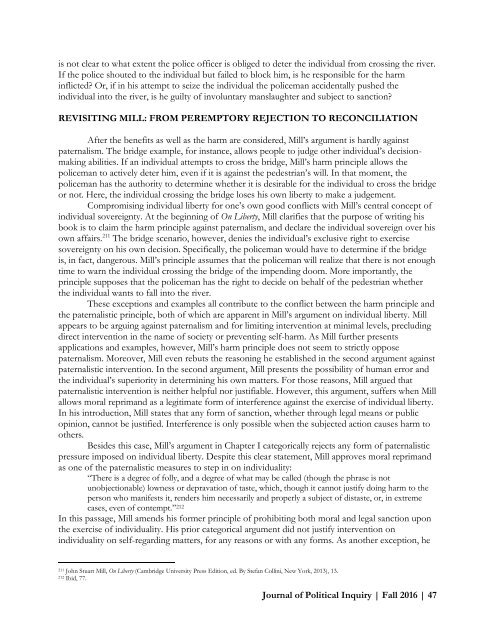Fall2016_Final
Create successful ePaper yourself
Turn your PDF publications into a flip-book with our unique Google optimized e-Paper software.
is not clear to what extent the police officer is obliged to deter the individual from crossing the river.<br />
If the police shouted to the individual but failed to block him, is he responsible for the harm<br />
inflicted? Or, if in his attempt to seize the individual the policeman accidentally pushed the<br />
individual into the river, is he guilty of involuntary manslaughter and subject to sanction?<br />
REVISITING MILL: FROM PEREMPTORY REJECTION TO RECONCILIATION<br />
After the benefits as well as the harm are considered, Mill’s argument is hardly against<br />
paternalism. The bridge example, for instance, allows people to judge other individual’s decisionmaking<br />
abilities. If an individual attempts to cross the bridge, Mill’s harm principle allows the<br />
policeman to actively deter him, even if it is against the pedestrian’s will. In that moment, the<br />
policeman has the authority to determine whether it is desirable for the individual to cross the bridge<br />
or not. Here, the individual crossing the bridge loses his own liberty to make a judgement.<br />
Compromising individual liberty for one’s own good conflicts with Mill’s central concept of<br />
individual sovereignty. At the beginning of On Liberty, Mill clarifies that the purpose of writing his<br />
book is to claim the harm principle against paternalism, and declare the individual sovereign over his<br />
own affairs. 211 The bridge scenario, however, denies the individual’s exclusive right to exercise<br />
sovereignty on his own decision. Specifically, the policeman would have to determine if the bridge<br />
is, in fact, dangerous. Mill’s principle assumes that the policeman will realize that there is not enough<br />
time to warn the individual crossing the bridge of the impending doom. More importantly, the<br />
principle supposes that the policeman has the right to decide on behalf of the pedestrian whether<br />
the individual wants to fall into the river.<br />
These exceptions and examples all contribute to the conflict between the harm principle and<br />
the paternalistic principle, both of which are apparent in Mill’s argument on individual liberty. Mill<br />
appears to be arguing against paternalism and for limiting intervention at minimal levels, precluding<br />
direct intervention in the name of society or preventing self-harm. As Mill further presents<br />
applications and examples, however, Mill’s harm principle does not seem to strictly oppose<br />
paternalism. Moreover, Mill even rebuts the reasoning he established in the second argument against<br />
paternalistic intervention. In the second argument, Mill presents the possibility of human error and<br />
the individual’s superiority in determining his own matters. For those reasons, Mill argued that<br />
paternalistic intervention is neither helpful nor justifiable. However, this argument, suffers when Mill<br />
allows moral reprimand as a legitimate form of interference against the exercise of individual liberty.<br />
In his introduction, Mill states that any form of sanction, whether through legal means or public<br />
opinion, cannot be justified. Interference is only possible when the subjected action causes harm to<br />
others.<br />
Besides this case, Mill’s argument in Chapter I categorically rejects any form of paternalistic<br />
pressure imposed on individual liberty. Despite this clear statement, Mill approves moral reprimand<br />
as one of the paternalistic measures to step in on individuality:<br />
“There is a degree of folly, and a degree of what may be called (though the phrase is not<br />
unobjectionable) lowness or depravation of taste, which, though it cannot justify doing harm to the<br />
person who manifests it, renders him necessarily and properly a subject of distaste, or, in extreme<br />
cases, even of contempt.” 212<br />
In this passage, Mill amends his former principle of prohibiting both moral and legal sanction upon<br />
the exercise of individuality. His prior categorical argument did not justify intervention on<br />
individuality on self-regarding matters, for any reasons or with any forms. As another exception, he<br />
211<br />
John Stuart Mill, On Liberty (Cambridge University Press Edition, ed. By Stefan Collini, New York, 2013), 13.<br />
212<br />
Ibid, 77.<br />
Journal of Political Inquiry | Fall 2016 | 47
















